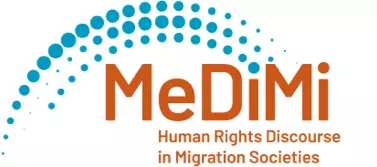Sub-project C.3
“Doing Human Rights”: How the Categories of “Human” and “Migrant” are Made (Ir-)Relevant in Everyday Life
The project asks whether, how, and with what consequences a “human-rights-ization” of everyday discourse in migration societies is taking place. It follows the empirical observation that everyday interactions are permeated by multiple migration-related distinctions as well as by a postulate of universal equality. This ambivalent and ambiguous constellation makes interaction an arena in which various combinations of the making (ir-)relevant of “being a migrant” and “being human” are negotiated, and practices of (un)doing migrant can intertwine with those of (un)doing human in a variety of ways. Whether and how doing human rights while doing migrant comes into play is a question which has not been investigated empirically so far.
The aim of the project is to understand what (discursive) practices of making the person category “migrant” and the de-differentiation category “human being” (ir-)relevant are used in conflictual interactions in semi-public situations and on what their interactive implementation depends. The project also seeks to determine what role the reference to human rights plays in these categorization practices and what consequences the use of human rights practices has for everyday communication.
Relevant research fields are (a.) the sociology of everyday life, which is dedicated to questions about the structures, rules, and forms of interaction, and (b.) sociological studies on the genesis, scope, and discursive meaning of human rights. The heuristic vehicle for linking these is (c.) the approach of human differentiation, which can be used to study empirically how the category “migrant” is made interactively relevant and how human rights discourse expands in everyday life. Using this heuristic, ethnographic fieldwork is conducted in four contrasting sub-areas of everyday life where negotiations of “being human”, “being a migrant”, and human rights can be expected: School, religion, sports, and youth work. The location of the ethnography is Mannheim, where two sub-studies are conducted in the neighborhoods of Hochstätt and Neckarstadt-West, which have been shown to differ in terms of ethnic classification processes in previous studies.
Principal Investigator: Prof. Dr. Dariuš Zifonun
Research Associates: Tasnim Jabaly, Sebastian Weste
Center for Conflict Studies, Philipps University Marburg
